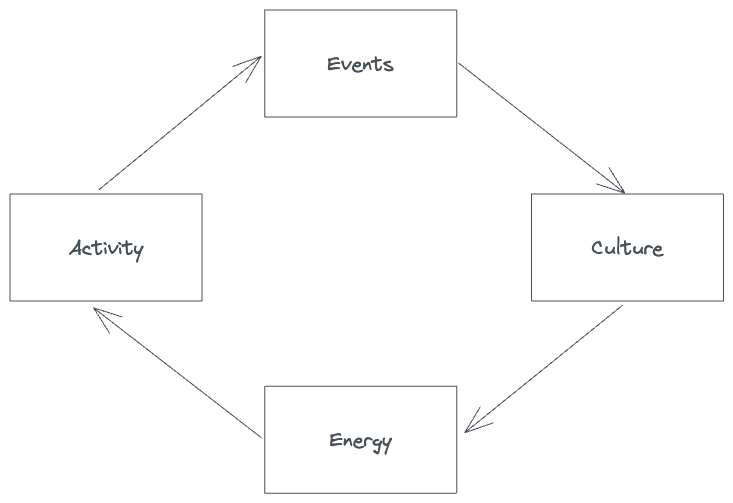Culture and energy for people who think they’re bullshit
Over time I’ve become less allergic to two concepts that always felt needlessly hand-wavy and unhelpful: “energy” and “culture”. But both point at very practical concepts that needs describing, and I’ve started thinking about them as connected, especially in a work context.
These are probably not original ideas, but again, I’ve been allergic to most presentations of them because they felt unhelpful. Hopefully the way I describe them, even if wholly unoriginal, will break through to someone who would normally ignore this sort of thing.
What’s the difference between a Michael Jackson concert and a chamber orchestra performance? There are a bunch of distinguishing characteristics, but at the highest level it can be boiled down to a difference in energy.
How do you describe the default set of reactions to events within a group of people? Again, there are a bunch of interlocking phenomena here, but at a highest level the best descriptor we have is “culture”. If an individual is a bag of conditioned reactions, culture describes that phenomenon at an inter-personal group level.
An example: someone closes a big new customer at work. What is everyone’s default reaction to that? Unadulterated jubilation? Cautious tempered optimism. Immediate anxiety around whether the customer will eventually churn?
Each of these reactions leads to a different energy. Unadulterated jubilation is like a Michael Jackson concert, cautious tempered optimism like a joyful Bach piece, and immediate anxiety more like some emo.
This interaction between culture (default reaction) and energy (emotional tenor) feeds into a loop.

Most descriptions of culture I’ve come across, and most ways that companies discuss their own culture, are vapid and unhelpful. “Culture” as a business term is rightfully derided as shorthand for “we have a ping pong table in the cafeteria”.
And most descriptions of energy, like, you totally gotta check out my crystals, man, are also abstract and not relatable to normal experience.
I suspect it’s because it’s actually quite hard to introspect into what an organization’s set of default reactions is, and what the energy those produce are. This is not unlike the challenge of describing your own set of default reactions and emotional tenor. In most ways, what you’re used to is all you know, and only with lots of experience do you get to see variety in a way that deepens your understanding of the possible.
In the end my suspicion is that most people are ChatGPT’ing it when talking about culture or energy. They’ve assembled a loose set of data that points roughly in a direction that resembles understanding, but when they try to explain themselves it often isn’t very helpful. They’re not wrong enough that someone with a deeper understanding can tell them they’re wrong, and they’re not right enough to convince people who have even less understanding.
Culture and energy can feel like unseen specters, dictating the shape of our days, weeks, and years. But with some genuine understanding comes the opportunity to shift and change that feedback loop for the better.
Member discussion